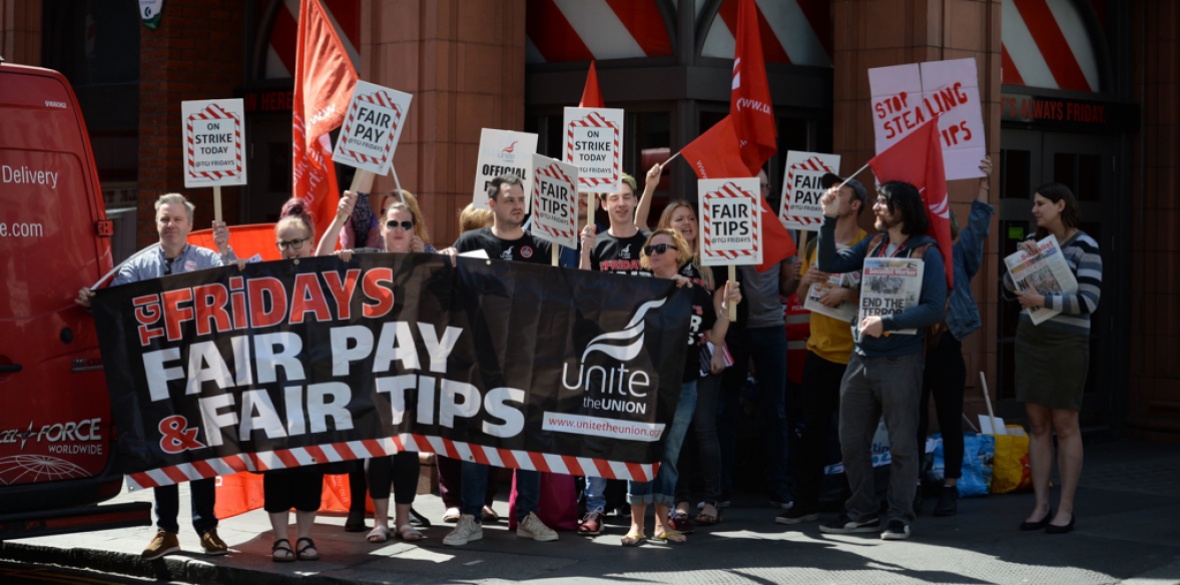This is the last article you can read this month
You can read more article this month
You can read more articles this month
Sorry your limit is up for this month
Reset on:
Please help support the Morning Star by subscribing here
WETHERSPOON workers will go on strike today for the first time in the company’s history.
Joining TGI Friday’s workers, who have taken strike action eight times over tips this year, McDonald’s workers, who went on strike for the very first time in Britain last September, and now Uber Eats and Deliveroo couriers, they will be coming together for a day of action over poverty pay.
These workers, many of them young, represent a growing movement of workers in the hospitality sector and beyond who are uniting, joining trade unions and realising their own power.
Spurred on through the innovative work of trade unions, they are taking a stand against intolerable conditions — poverty pay, insecure hours and employers who refuse to engage properly with staff, something that can only be meaningfully achieved through the presence of democratic trade union structures in the workplace.
Across the economy too many workers face similar conditions. Ten years after the financial crisis, workers’ wages have stagnated while company profits have supersized.
Uncurbed finance is driving ever more pressure on workers’ conditions, both in terms of wages but also in the intensification of work.
The call for guaranteed hours is not just a demand about income, it is also a stand against managers using the constant threat of losing hours as a means to discipline workers, with discrimination reportedly rife.
It is worth remembering that employers’ exercise of power over workers is not blind to sex or race. When workers are unable to hold their employers to account or have their voice heard at work, it is the already marginalised, women, black, migrant and young workers who face the brunt. It is against this feeling of powerlessness that these workers have organised in trade unions.
It is no coincidence that sectors such as hospitality, with the most insecurity and worst conditions, have the highest proportion of women, black, migrant and young workers.
For this reason, efforts to organise these workers must challenge oppressive sexism, racism and xenophobia alongside exploitation by employers.
When workers have no voice at work, having their voices and faces at the front of the campaign is not only effective but also communicates to other workers in the sector that these campaigns genuinely address the oppressive conditions they face.
Given the severe imbalance of power that precarious workers face, community and political mobilisation is a critical factor in building workers’ confidence to take action and holding employers to account.
The demand must be, “If you want to operate in our communities, you must treat us with respect.” Calling on business to invest in the communities where they are by paying their taxes and giving workers a wage sufficient to live on highlights the ways in which workers’ struggles for a living wage connect with the broader struggle against neoliberalism.
The McDonald’s, TGI Friday’s and now Wetherspoon workers not only deserve applause and congratulations, but they need the kind of support that builds power in our communities and gives workers the confidence to take action against powerful multinationals.
It represents not just the latest shiny campaign but an opportunity to revitalise our movement and halt the deterioration of working conditions that 40 years of neoliberalism has brought.
Winning in hospitality and the service sector matters, not just because of the intolerable conditions those workers face but because it drives down conditions for everyone. War on Want is committed to supporting this growing movement. Join us.
Owen Espley is senior economic justice campaigner at War on Want.











